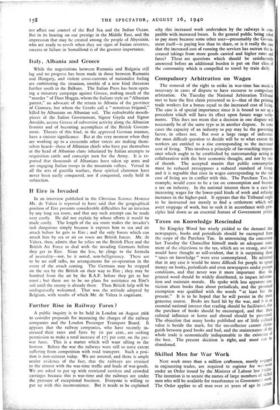Further Rise in Railway Fares ?
A public inquiry is to be held in London on August 26th to consider proposals for increasing the charges of the railway companies and the London Passenger Transport Board. It appears that the railway companies, who have recently in- creased their rates and fares by to per cent., are seeking permission to make a total increase of 171 per cent. on the pre- war fares. This is a matter which will want sifting to the bottom. Before the war the railways were still to some extent suffering from competition with road transport. Such a posi- tion is non-existent today. We are assured, and there is ample ocular evidence of the fact, that the railways are strained to the utmost with the war-time traffic and loads of war-goods. We are asked to put up with restricted services and crowded carriages because this is war-time and the railways are under the pressure of exceptional business. Everyone is willing to put up with this inconvenience. But it needs to be explained why this increased work undertaken by the railways is corn. patible with increased losses. Is the general public being asked to pay more because some other user—presumably the Govern. ment itself—is paying less than its share, or is it really the case that the increased cost of running the services has outrun the in- creased takings from more goods carried and higher rates and fares? These are questions which should be satisfactorily answered before an additional burden is put on that class of the community which is compelled to travel by train daily.


























 Previous page
Previous page